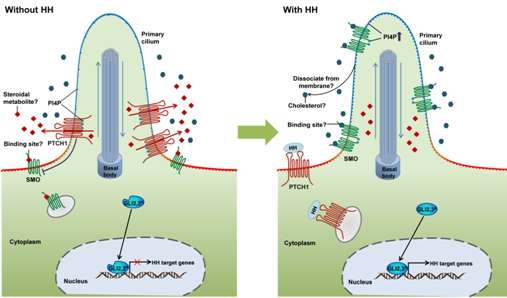Scientists review the basic and translational studies of hedgehog signaling

Hedgehog (HH) signaling plays an important role in certain types of adult stem cells and cancer stem cells. Its aberrant activity is linked to degenerative diseases and a multitude of cancers.
Considerable interest has focused on studying the mechanisms of HH signaling pathway and the identification of drugs that modulate the pathway activity. Decades of work delivered successful cancer therapies out of basic biology, exemplified by two leading drugs, vismodegib and sonidegib, recently approved by the U.S. Food and Drug Administration (FDA) for treatment of advanced skin cancer.
Studies on chemical modulation mechanisms, especially those of important therapeutic targets such as the HH pathway, attract a great deal of interest, as they often open new avenues towards innovative therapies.
Recently, in recognition of their work on this topic, Prof. WANG Yu from the Institute of Zoology, Chinese Academy of Sciences, and Professor Andrew P. McMahon from University of South California were invited by the journal Elife to comment on latest work from scientists at Stanford, Harvard, and Oxford on newly discovered mechanisms of chemical modulation of HH signaling.
Upon request by Cell Chemical Biology, WANG Yu and colleagues wrote a review entitled "Hedgehog Signaling: From Basic Biology to Cancer Therapy". They discussed latest advances in better understanding of the regulatory mechanisms of the HH pathway, especially chemical regulation mechanisms.
They proposed a hypothetical working model for endogenous chemical modulation, whose mechanism remains a major mystery in the field.
Further discussion on experiences and lessons learned from decades' long therapeutic development targeting the HH pathway were conducted. Suggestions of more precise interventions for better therapeutic outcomes were given.
Underlining mechanisms of drug resistance were then covered and ideas to circumvent it were discussed. Hopefully, it would inspire further development towards next generation cancer therapies.
More information: Fujia Wu et al. Hedgehog Signaling: From Basic Biology to Cancer Therapy, Cell Chemical Biology (2017). DOI: 10.1016/j.chembiol.2017.02.010

















